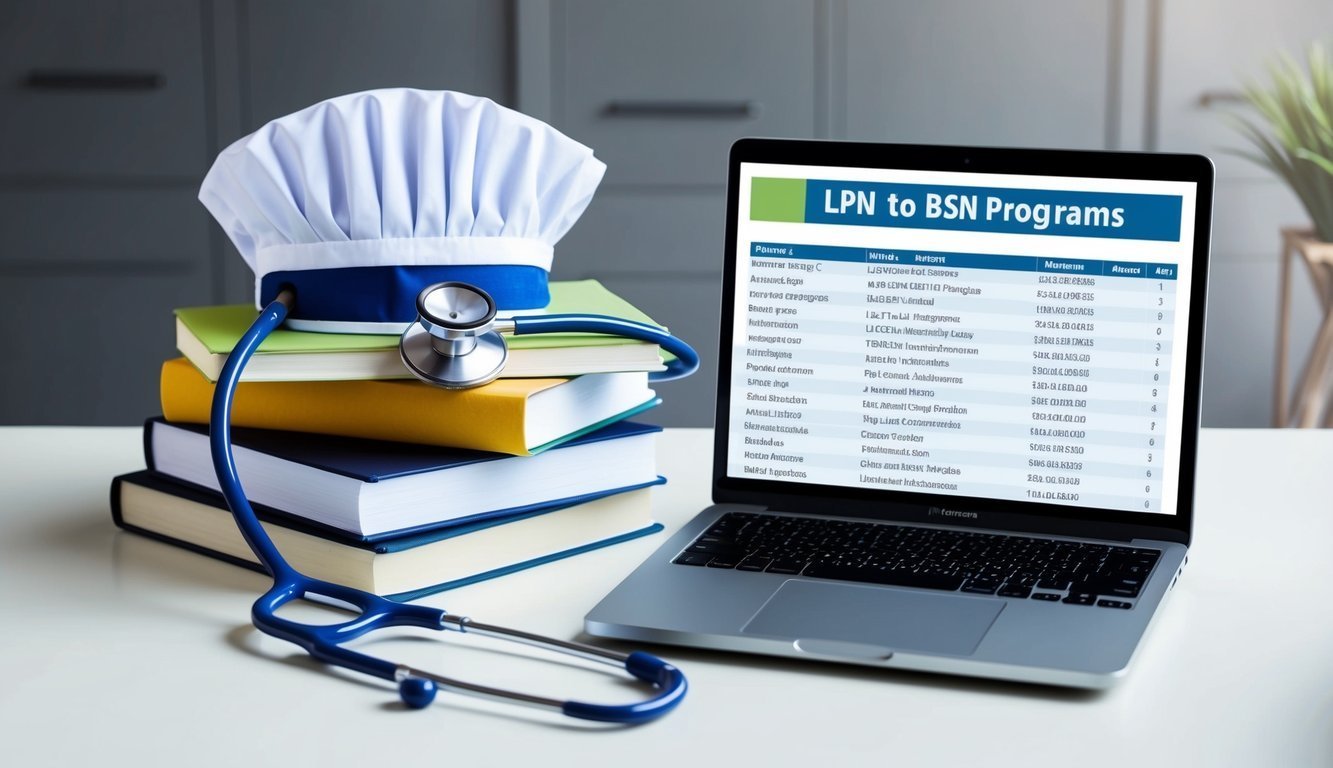Many licensed practical nurses (LPNs) seek ways to advance their careers and improve their earning potential. LPN to BSN programs are designed to help you transition from being an LPN to earning a Bachelor of Science in Nursing (BSN). These programs not only expand your nursing knowledge but also open doors to new job opportunities as a registered nurse (RN), enhancing your professional qualifications.
If you are looking for LPN to BSN programs near you, you’ll find a variety of options, both online and in-person.
Admission requirements and program structures may vary, but many institutions offer flexible schedules to accommodate working professionals.
This convenience helps ensure that you can balance your education with your current job responsibilities while reaching your goal of becoming a registered nurse.
Navigating the path from LPN to BSN can be challenging, but it is also rewarding.
As you consider your options, understanding the curriculum and financing can make a significant difference.
Explore your choices to find the best program that suits your needs and leverages your existing experience in the nursing field.
Key Takeaways
- LPN to BSN programs enable you to become a registered nurse.
- Flexible schedules help balance education with work.
- Understanding financing options is crucial for your success.
Understanding LPN to BSN Programs
LPN to BSN programs provide a pathway for Licensed Practical Nurses (LPNs) to advance their careers by becoming Registered Nurses (RNs) with a Bachelor of Science in Nursing (BSN).
These programs build on your current nursing foundation and prepare you for higher responsibilities in the healthcare field.
Leveraging a Licensed Practical Nurse (LPN) Foundation
As an LPN, you already possess essential nursing skills and knowledge.
This foundation allows LPN to BSN programs to focus on advanced concepts, critical thinking, and clinical practices.
By leveraging your existing expertise, you can complete the transition to an RN more efficiently.
The programs often recognize prior learning and may allow transfer credits, shortening your study time.
It’s crucial to choose a program that acknowledges your experience.
Look for institutions that offer a comprehensive curriculum designed to enhance your skills while building new ones relevant to RN roles.
Path to Becoming a Registered Nurse (RN)
Transitioning from LPN to RN is a structured process that involves enrolling in a bridge program that meets your needs.
The path typically includes both theoretical coursework and clinical practice.
Courses may cover areas like pharmacology, nursing leadership, and advanced patient care.
Most programs take between 2 to 3 years, depending on part-time or full-time study.
You can look for programs that offer flexible schedules to balance work and study.
After completing your studies, you will need to pass the NCLEX-RN exam to obtain your RN licensure.
This is a critical step in your journey.
Overview of LPN to BSN Bridge Programs
LPN to BSN bridge programs are designed specifically for licensed practical nurses looking to advance.
These programs offer a tailored curriculum to bridge the gap between LPN and RN education.
Many schools offer both online and on-campus options, making it easier for you to find a program near you.
Tuition costs can vary widely, ranging from $35,000 to $60,000 based on location and program format.
Be sure to check PracticalNursing.org for comprehensive lists of programs available.
When choosing a program, consider factors like accreditation, faculty credentials, and support services.
Selecting a program with a good track record can enhance your educational experience and career outcomes.
Admission Requirements and Prerequisites
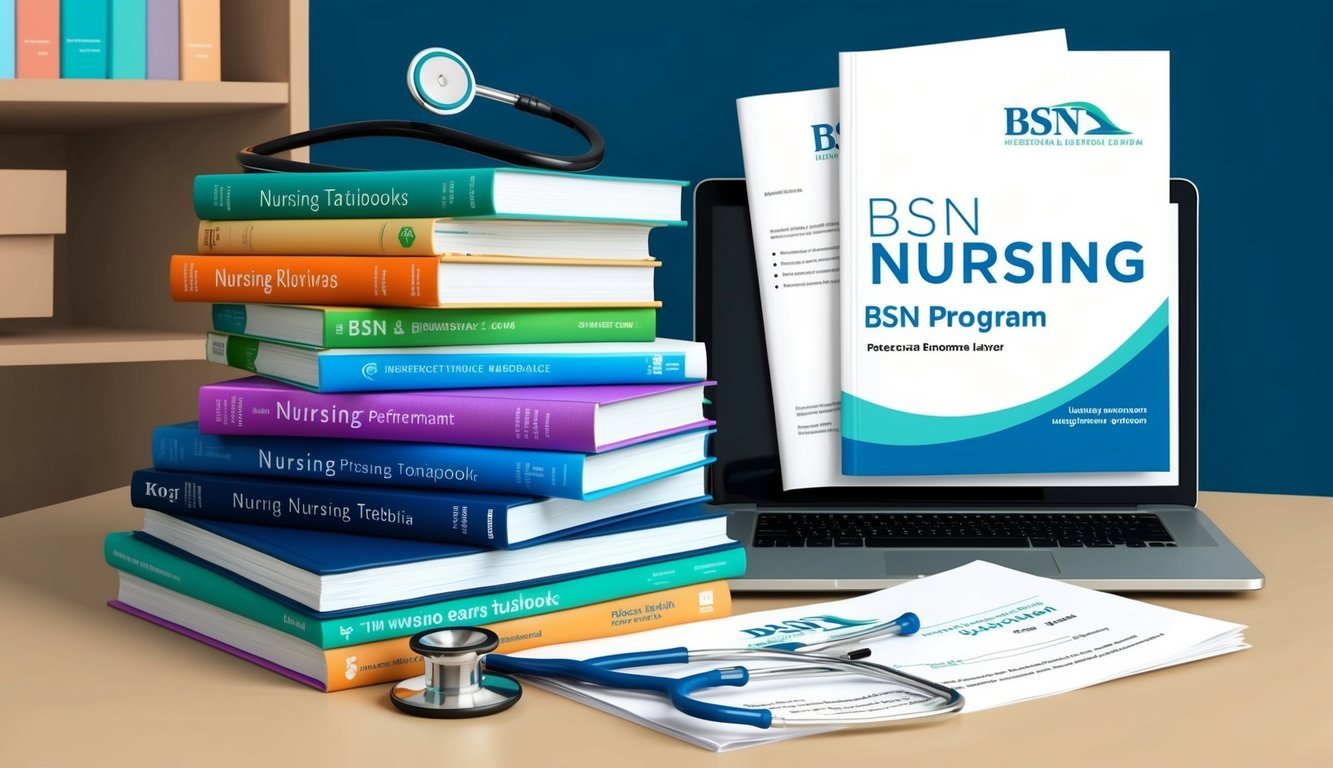
When transitioning from an LPN to a BSN program, it’s essential to understand the admission requirements and necessary prerequisites.
Being prepared can make your application process smoother and increase your chances of acceptance.
Making the Transition: From LPN to BSN
To enter a BSN program, you usually need to be a licensed practical nurse (LPN).
Many programs offer specific bridge pathways designed for LPNs.
This means you can transfer some of your existing knowledge and experience into the new program.
You will need to verify that your LPN license is valid and unencumbered.
Each school may have different admission criteria.
Generally, these criteria include a minimum GPA, completion of prerequisites, and passing any required entrance exams.
Understanding Prerequisite Courses
Before applying, it’s vital to complete specific prerequisite courses.
These courses often include:
- Human Anatomy and Physiology
- Microbiology
- Nutrition
- Psychology
Some schools may also ask for courses in English and Math.
Check with your chosen institution to identify exact requirements.
Missing a prerequisite could delay your admission.
Submitting Official Transcripts
When you apply to a BSN program, you must submit your official transcripts.
These documents provide proof of your academic history and show that you meet the required standards.
Your transcripts should include grades for any prerequisite courses.
If you graduated from an LPN program, transcripts from that institution are also necessary.
Make sure to request these documents early to avoid any delays.
Curriculum and Program Structure
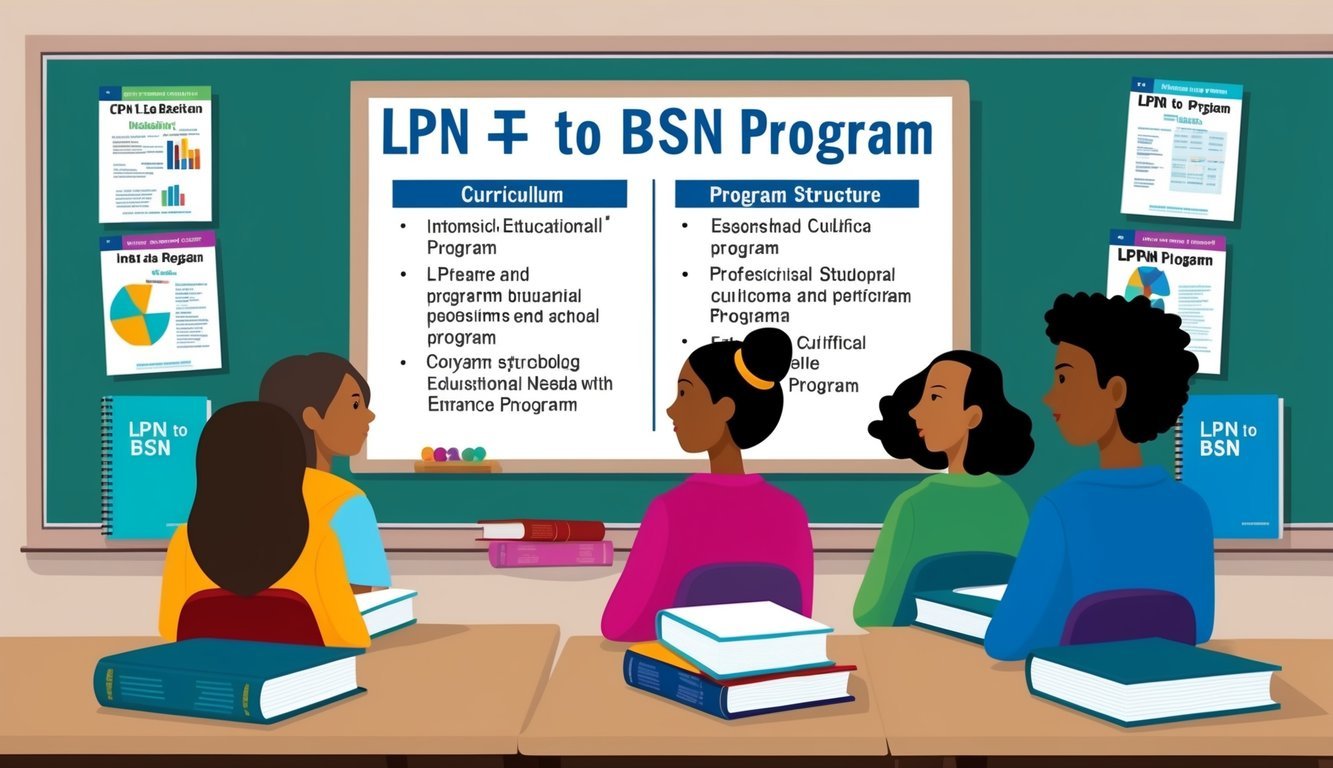
In LPN to BSN programs, the curriculum focuses on both theoretical knowledge and practical skills in nursing.
You will experience a blend of classroom learning and hands-on clinical practice that prepares you for advanced roles in the healthcare field.
LPN to BSN Curriculum Overview
The curriculum typically includes core nursing courses such as:
- Health Assessment
- Pharmacology
- Nursing Research
- Leadership and Management in Nursing
You will learn about patient care across various populations and settings.
This includes subjects like mental health nursing, pediatrics, and community health.
Many programs also integrate courses on ethics, cultural competence, and evidence-based practice, which are crucial in modern healthcare.
Clinical Experience and Practice
Clinical experience is a vital component of your training.
During your program, you will complete a set number of hours in various clinical settings, such as hospitals and clinics.
This allows you to apply what you learn in real-world situations, enhancing your skills.
Most programs offer placements that cover multiple areas of nursing.
You may work with patients of different ages and health conditions, providing you with a well-rounded experience.
This hands-on training is essential for preparing you for the transition from LPN to BSN.
Program Length and Coursework
Program length can vary, but many LPN to BSN programs are designed to be completed in 2-3 years.
The structure is often flexible to accommodate working professionals.
Courses are typically offered in a combination of formats, including traditional in-person classes, online coursework, and hybrid models.
Some schools may offer accelerated options that let you finish faster.
For example, an accelerated program at The University of Oklahoma can be completed in just 9 months.
Overall, you should expect to engage in both theoretical studies and practical, clinical experiences throughout your education.
This combined approach ensures you’re well-equipped for a successful nursing career.
Financing Your Education
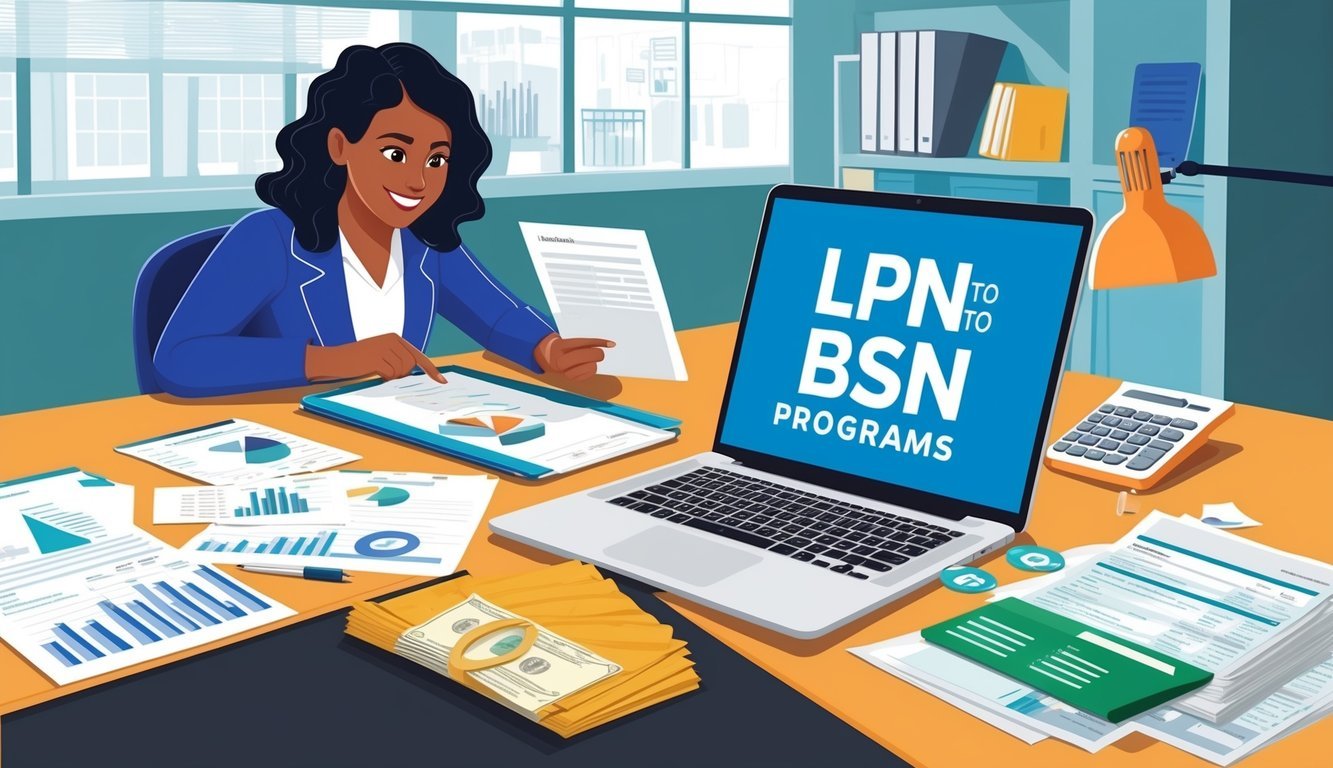
Paying for your LPN to BSN program is a significant consideration.
You have various financial aid options available, and understanding the costs involved can help you budget effectively.
Exploring Financial Aid Options
When looking to finance your education, start by exploring different financial aid options.
Federal and state grants can be a great resource, as they do not require repayment.
You can apply for these through the Free Application for Federal Student Aid (FAFSA).
Scholarships specifically for nursing students are also available.
Many organizations offer scholarships based on various criteria such as academic performance, community service, or financial need.
Additionally, consider low-interest student loans.
These can help cover tuition costs but should be approached with caution due to repayment terms.
Check with the financial aid office of schools you’re interested in to find funds available for your specific program.
Costs of LPN to BSN Programs
Understanding the costs associated with LPN to BSN programs is crucial.
Tuition can range widely, depending on the institution and program format.
Typically, you might expect to pay between $35,000 to $60,000 for the entire program.
Here’s a brief breakdown of potential costs:
| Cost Type | Estimated Amount |
|---|---|
| Tuition | $35,000 – $60,000 |
| Books and Supplies | $1,000 – $2,000 |
| Fees | $500 – $1,500 |
| Clinical Supplies | $500 – $1,000 |
Online programs may also have different pricing.
For instance, the online LPN to BSN program at Indiana State University costs $11,656.
Understanding these costs can help you plan effectively.
Online Education and Advancements in Nursing
Online education is transforming nursing education, especially for those interested in LPN to BSN programs.
Flexibility and accessibility are key features that appeal to many aspiring nurses.
This format allows you to focus on your career while advancing your education.
Benefits of Online LPN to BSN Programs
Online LPN to BSN programs offer numerous advantages.
One significant benefit is the flexibility of studying at your own pace.
You can create a schedule that fits your work and personal life.
Another major advantage is the access to a wider range of programs.
You can choose from various accredited schools without geographical limitations.
This makes it easier to find a program that fits your needs.
Additionally, online learning often includes a blend of theoretical and practical experiences.
This combination helps you gain real-world nursing skills while studying important concepts.
Many programs also provide online resources and support systems to help you succeed.
Balancing Work and Education
Balancing work and education can be challenging, but online LPN to BSN programs help make it possible.
You can take classes at times that work best for you, allowing you to maintain your job.
Creating a study schedule can keep you organized.
For example, set aside specific hours each week dedicated to coursework.
Use tools like calendars or apps to track assignments and deadlines.
It’s also crucial to communicate with your employer about your education goals.
Many employers support their employees’ educational pursuits through flexible scheduling or tuition assistance.
Engaging with online support communities can be beneficial, too.
These can provide motivation and guidance as you navigate this journey.
Frequently Asked Questions
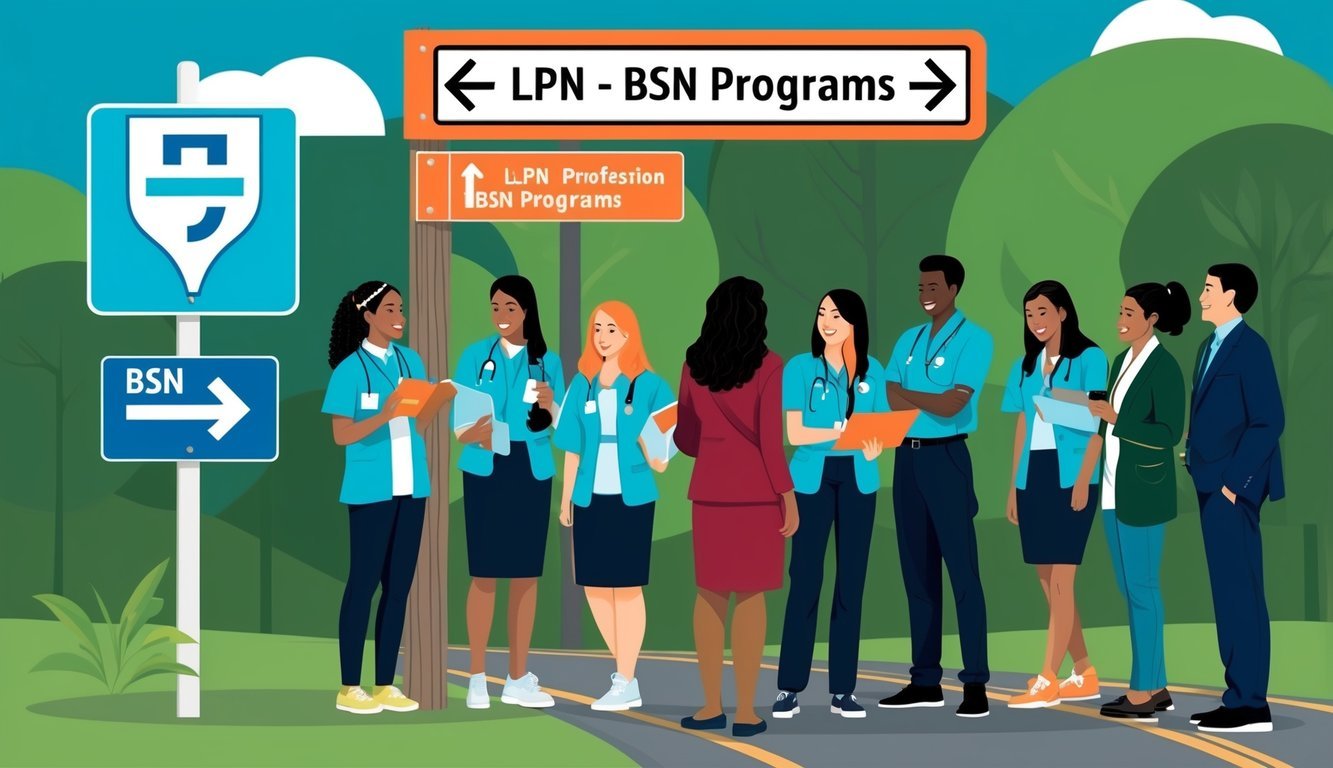
When considering an LPN to BSN program, you may have several questions.
Understanding the prerequisites, timeframe, and available options can help you make informed decisions about your education and future career.
What are the prerequisites for enrolling in an LPN to BSN program?
You typically need an active LPN license and must complete specific prerequisite courses.
These often include subjects like anatomy, physiology, microbiology, and English composition.
Some programs may also require a minimum GPA.
How long does it typically take to complete an LPN to BSN program?
Most LPN to BSN programs take between 12 to 24 months to complete.
The exact duration may depend on whether you attend full-time or part-time, as well as the specific curriculum of the program.
Are there any accredited online LPN to BSN programs available?
Yes, many accredited online LPN to BSN programs exist.
These programs provide flexible learning options that allow you to balance work and study.
You can find a list of reputable programs here.
What is the NCLEX-RN pass rate for graduates of LPN to BSN programs?
NCLEX-RN pass rates can vary by program.
It’s essential to check each program’s statistics.
Many schools report high pass rates, often around 90% or higher, reflecting the quality of their education.
How do LPN to BSN program curriculums typically integrate clinical experience?
LPN to BSN programs usually include clinical rotations as part of the curriculum.
These experiences allow you to apply learned skills in real healthcare settings.
You will work with patients under the supervision of experienced nurses.
What financial aid options are available for students in LPN to BSN programs?
Students pursuing an LPN to BSN program can access various financial aid options.
These include grants, scholarships, and student loans.
Some employers may also offer tuition reimbursement or assistance.
It’s worth exploring programs that provide tuition assistance.

